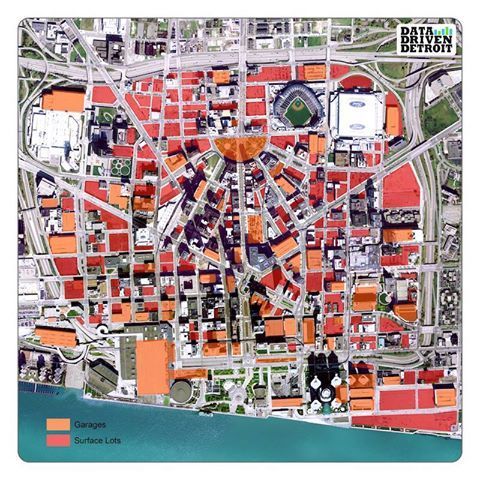Every American city has parking craters — as we've catalogued extensively — but downtown Detroit is especially damaged. The problem persists, blighting downtown, even as its fortunes have risen in recent years.
Why are parking craters so hard to get rid of? The Detroit Free Press dove into that question in an outstanding recent report, that offers clues about parking and land use problems that are widely applicable.
Here are some of the more interesting takeaways:
#1. About half the area of downtown Detroit comprises surface parking lots
The Free Press says there are 800 parcels in central downtown. Only half have buildings on them. The rest are mostly surface parking.
In total, they estimate there are 67,000 spaces in downtown Detroit. By comparison, downtown Denver has 43,000 off-street spaces. The cities are comparably sized, population-wise, but Denver is the one that made crucial improvements.
#2. Detroiters don't have many good alternatives to driving and parking even downtown
Only about five percent of downtown Detroit workers take transit. Compared with more than 30 percent in New York and 20 percent in Chicago, according to the Free Press.
That's partly because, as we've reported so many times before, Detroit's transit system is awful. The Free Press mostly treats the need to drive downtown as a given. But it does mention services like Uber and Lyft, the potential expansion of the region's transit system or self-driving cars could greatly reduce the need for downtown parking.
#3. Just two guys own a huge percentage
Dan Gilbert of Quicken Loans and the Ilitch Family of Little Caesars Pizza own a huge percentage of downtown parking. Gilbert's company controls about 12,000 spaces — many of them in garages, the Free Press reports. The Ilitch family own another enormous proportion, which are mostly surface lots, Freep reports, and "mostly empty" except during special events on weekends.
Many downtown parking lot owners go to great lengths to hide their identities, Freep reports.
#4. The lots make big money
People pay as much as $50 per space to parking downtown during the mostly Sunday Detroit Lions games, the Free Press reports. In total, the paper estimates downtown parking generates about $175 million a year for private owners — and millions in taxes for the city government.
#5. Owners speculating on land
The Free Press interviewed parking lot owner Greg Tremonti, one of the city's smaller, family-owned operators. He said he was receiving calls from people interested in developing the land all the time — but he refused to sell because owning the lot was such a sweet deal for him.
"Everybody’s been chasing it," told the paper. "My mother’s very happy and the property value just keep going up and up. Just not interested. At this point, it don’t hurt nothing. Beats the stock market.”
Land speculation can be harmful to cities. But it's especially bad in a very poor city like Detroit, where property tax revenues have declined dramatically since pre-recession levels, making it difficult for the city to sustain basic services for residents.
Detroit could alter the equation by changing the way it taxes these properties, or by incentivizing developers to convert the lots to residential use, which could raise more money. Unfortunately, with ownership concentrated among some of the region's wealthiest and most influential families, that might be difficult politically.






